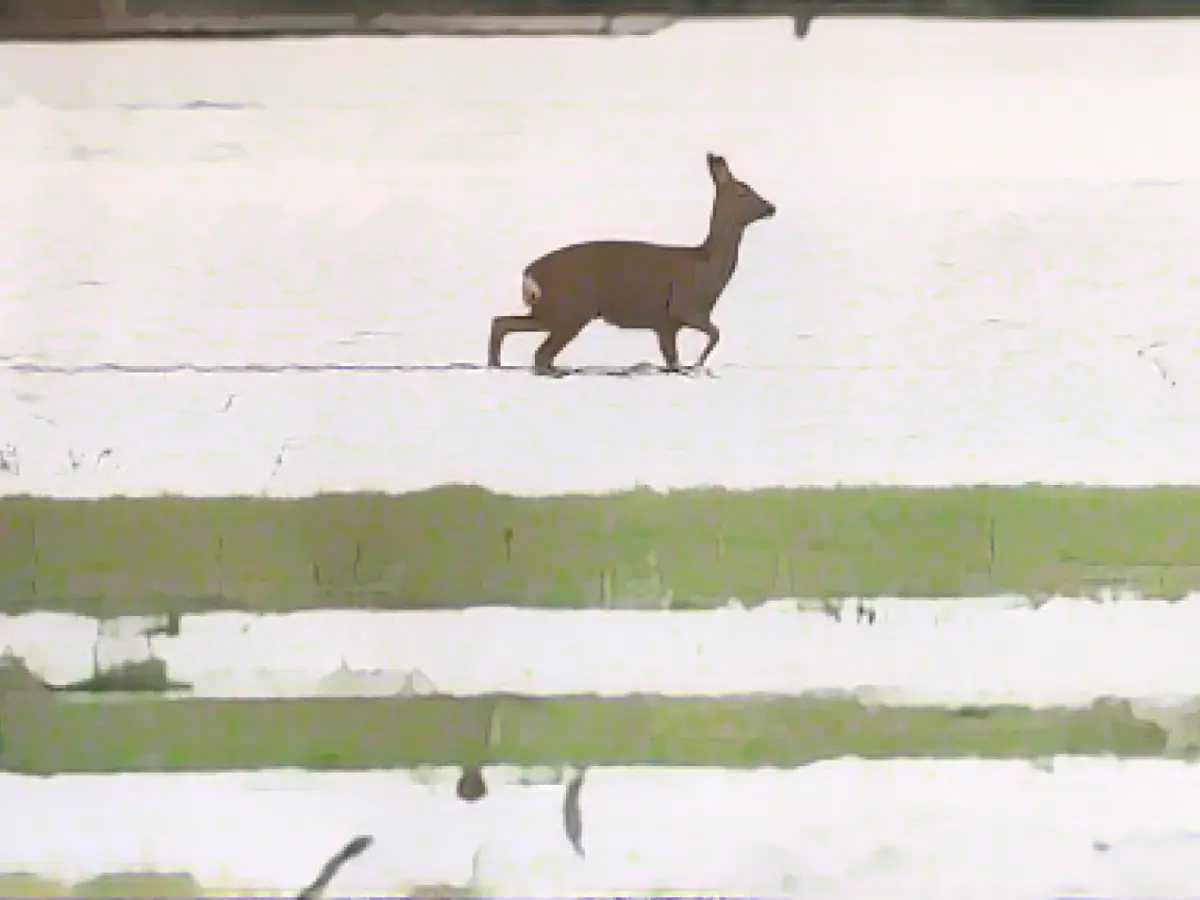Animals - Bees, rabbits and earthworms in floods
The brood of many wild bees dies in floods. Moles can save themselves if they react quickly enough. Foxes sometimes climb onto dykes when there are no tourists there. How floods affect wild animals:
Moles
Moles can swim well, but avoid contact with water. "If the flood comes too quickly, many moles don't get out of their burrow in time," says Jenifer Calvi from the German Wildlife Foundation. If the water rises slowly, some of the animals still manage to move, namely above the ground. Moles often build so-called swamp castles in wet meadows. The mounds can be around one meter high and have a diameter of up to 1.5 meters.
Hares, deer and co.
According to the Wildlife Foundation, many animals are used to flooding: roe deer, stags, wild boar and foxes then retreat to reasonably dry places in the forest - at least in areas where this is possible.
"Brown hares have a hard time in damp conditions. They are originally steppe dwellers and like it warm and dry," says Calvi. Young animals in particular can become ill and die if it is constantly wet.
Hare, deer and fox often have to climb onto dykes during floods to save themselves, Calvi emphasizes. If there are too many onlookers, they may run back into the water and drown. "Anyone who has no business being on the dykes should therefore avoid them."
Birds
Floods are not a problem for most birds outside the breeding season, but constant rain is, says bird expert Martin Rümmler from the German Nature and Biodiversity Conservation Union (Nabu). Although they can stay in sheltered places for a long time, they have to leave them to forage for food even in constant rain. "The smaller the bird is, the easier it cools down when its plumage is soaked. Tits are more vulnerable than pigeons." Continuous rain is not necessarily a threat to the population, but it is dangerous or unfavorable for individual animals.
According to Rümmler, anyone who finds a sick, hypothermic bird should approach it carefully and place it in a dry box that is open on one side. This should be placed outside in as warm a place as possible. Indoors, the risk of injury is too high for birds when they fly off again.
Insects
According to Calvi, insects are also at risk from flooding: eggs of many wild bees, larvae of some beetles and numerous young bumblebee queens spend the winter in the ground - they are all lost in floods.
Earthworms
Earthworms can survive floods surprisingly well, says Johann Zaller from the University of Natural Resources and Life Sciences, Vienna. "There are reports that earthworms can survive flooding for several weeks, even several months." There are differences between the almost 50 different earthworm species in Germany. However, they can also absorb oxygen directly from the water to a certain extent via cutaneous respiration.
"It is assumed that they do not come to the surface when it rains because there is a lack of oxygen in the soil. But because the conditions during rain - high humidity, no sun - are favorable for them to expand their habitat," says Zaller. "In addition, earthworms can only mate on the surface, and the conditions are favorable when it rains, because in the sun there is a risk that they will dry out during the mating act, which lasts several hours." It is possible that some earthworms have been washed away from the surface by the current flooding. "However, some of them retreat back into the ground after mating, even when it rains."
"At this time of year, a large proportion of the populations in the cocoon stage probably remain immobile in the soil anyway," says Zaller. These cocoons can survive for a very long time.
Earthworms ensure good soil aeration, increase water infiltration and improve the build-up of humus in the soil. This helps to prevent flooding, "as the water seeps away more quickly in earthworm-rich soil and a higher humus content acts like a sponge that can hold the water better".
Read also:
- Floods: water levels remain critical in many places
- Snow chaos further restricts Bavaria
- Continuous operation in the flood areas
- Flood situation remains tense in many places
- In Germany, the Nature Conservation Association Germany is concerned about the impact of floods on various animals, including moles, rabbits, and earthworms.
- Before the floods, rabbits, often found in dry areas, may have to seek refuge in higher ground or climb onto dykes to avoid drowning.
- In Berlin, the weather forecast indicated heavy rain and potential flooding, causing concern for local animals and their habitats.
- Science has shown that earthworms, despite being sensitive to bad weather, can survive floods for several weeks or even months by absorbing oxygen directly from the water.
- Insects, such as wild bee larvae and bumblebee queen eggs, are at risk during floods as they spend the winter in the ground.
- Some animals, like moles, have adapted to floods by building swamp castles above ground, providing them with a dry place to stay during floods.
- Birds, like tits, are less resilient to continuous rain than larger birds, such as pigeons, which can find shelter and food more easily.
- Floods are generally not a threat to most birds outside the breeding season, but they need to forage for food even in bad weather.
- The German Nature and Biodiversity Conservation Union (Nabu) recommends placing sick or hypothermic birds in a dry box outside and in a warm place to help them recover, avoid indoor risks for birds.
Source: www.stern.de






